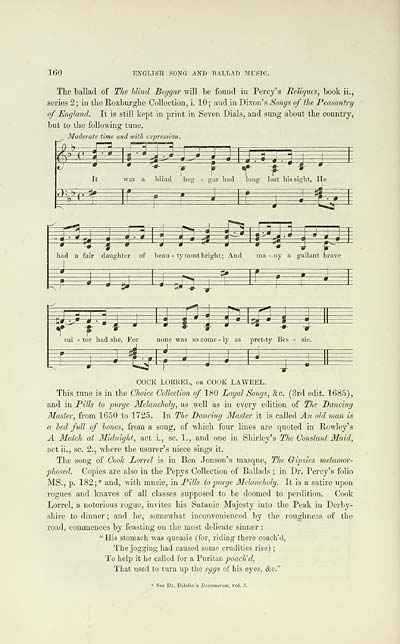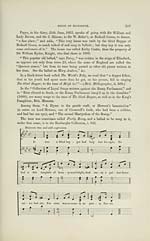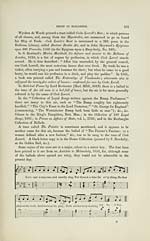Glen Collection of printed music > Printed text > Popular music of the olden time > Volume 1
(194) Page 160 - Cock lorrel, or Cook lawrel
Download files
Complete book:
Individual page:
Thumbnail gallery: Grid view | List view

160
ENGLISH SONG AND BALLAD MUSIC.
The ballad of The Wind Beggar will be found in Percy's ReUques, book ii.,
series 2; in tlie Roxburgbe Collection, i. 10; and in Dixon's Songs of the Peasantry
of England. It is still kept in print in Seven Dials, and sung about tbe country,
but to the following tune.
Moderate time and with expression.
i
d2-
S
1^
te
^
^^
tj
7 f '-r' .f -^ „
It was a blind beg - gav had long lost his sight, He
fc^^^fepFy
^
^m
^
1"=^
^3
^
izne
^
had a fair daughtei- of beau - ty most bright; And ma - ny a gallant brave
3E
^^
-s*
3^
g
P
f
^
=fts^
sui -tor had she, For none was so come -ly as pret^ty Bes - sie
m^^^^
COCK LORREL, ok COOK LAWEEL.
This tune is in the Choice Collection o/" 180 Loyal Songs, &c. (3rd edit. 1685),
and in Pills to purge Melancholy, as well as in every edition of Tlie Dancing
Master, from 1650 to 1725. In The Dancing Master it is called An old man is
a bed full of hones, from a song, of which four lines are quoted in Rowley's
A Match at Midnight, act i., sc. 1., and one in Shirley's The Constant Maid,
act ii., sc. 2., where the usurer's niece sings it.
The song of Cooh Lorrel is in Ben Jonson's masque, The Cripsies metamor-
phosed. Copies are also in the Pepys Collection of Ballads ; in Dr. Percy's folio
MS., p. 182;'' and, with music, in Pills to purge Melancholy. It is a satii'e upon
rogues and knaves of all classes supposed to be doomed to perdition. Cook
Lorrel, a notorious rogue, invites his Satanic Majesty into the Peak in Derby-
shire to dinner; and he, somewhat inconvenienced by the roughness of the
road, commences by feasting on the most delicate sinner :
" His stomach was queasie (for, riding there coaoh'd,
The jogging had caused some crudities rise) ;
To help it lie called for a Puritan jjoach'd,
That used to turn up the eggs of his eyes, &c."
' See Dr. DibiUn's Decameron, vol. 3.
ENGLISH SONG AND BALLAD MUSIC.
The ballad of The Wind Beggar will be found in Percy's ReUques, book ii.,
series 2; in tlie Roxburgbe Collection, i. 10; and in Dixon's Songs of the Peasantry
of England. It is still kept in print in Seven Dials, and sung about tbe country,
but to the following tune.
Moderate time and with expression.
i
d2-
S
1^
te
^
^^
tj
7 f '-r' .f -^ „
It was a blind beg - gav had long lost his sight, He
fc^^^fepFy
^
^m
^
1"=^
^3
^
izne
^
had a fair daughtei- of beau - ty most bright; And ma - ny a gallant brave
3E
^^
-s*
3^
g
P
f
^
=fts^
sui -tor had she, For none was so come -ly as pret^ty Bes - sie
m^^^^
COCK LORREL, ok COOK LAWEEL.
This tune is in the Choice Collection o/" 180 Loyal Songs, &c. (3rd edit. 1685),
and in Pills to purge Melancholy, as well as in every edition of Tlie Dancing
Master, from 1650 to 1725. In The Dancing Master it is called An old man is
a bed full of hones, from a song, of which four lines are quoted in Rowley's
A Match at Midnight, act i., sc. 1., and one in Shirley's The Constant Maid,
act ii., sc. 2., where the usurer's niece sings it.
The song of Cooh Lorrel is in Ben Jonson's masque, The Cripsies metamor-
phosed. Copies are also in the Pepys Collection of Ballads ; in Dr. Percy's folio
MS., p. 182;'' and, with music, in Pills to purge Melancholy. It is a satii'e upon
rogues and knaves of all classes supposed to be doomed to perdition. Cook
Lorrel, a notorious rogue, invites his Satanic Majesty into the Peak in Derby-
shire to dinner; and he, somewhat inconvenienced by the roughness of the
road, commences by feasting on the most delicate sinner :
" His stomach was queasie (for, riding there coaoh'd,
The jogging had caused some crudities rise) ;
To help it lie called for a Puritan jjoach'd,
That used to turn up the eggs of his eyes, &c."
' See Dr. DibiUn's Decameron, vol. 3.
Set display mode to: Large image | Transcription
Images and transcriptions on this page, including medium image downloads, may be used under the Creative Commons Attribution 4.0 International Licence unless otherwise stated. ![]()
| Special collections of printed music > Glen Collection of printed music > Printed text > Popular music of the olden time > Volume 1 > (194) Page 160 - Cock lorrel, or Cook lawrel |
|---|
| Permanent URL | https://digital.nls.uk/91369775 |
|---|
| Shelfmark | Glen.254 |
|---|---|
| Additional NLS resources: | |
| Attribution and copyright: |
|
| Description | Scottish songs and music of the 18th and early 19th centuries, including music for the Highland bagpipe. These are selected items from the collection of John Glen (1833 to 1904). Also includes a few manuscripts, some treatises, and other books on the subject. |
|---|
| Description | The Glen Collection and the Inglis Collection represent mainly 18th and 19th century Scottish music, including Scottish songs. The collections of Berlioz and Verdi collected by bibliographer Cecil Hopkinson contain contemporary and later editions of the works of the two composers Berlioz and Verdi. |
|---|

